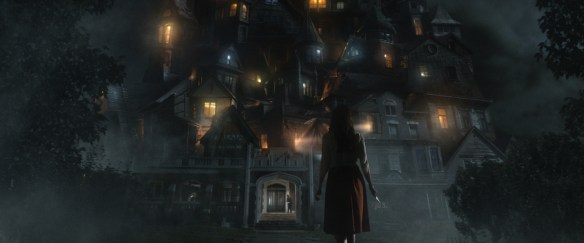Hello folks, and welcome back to Wrong Every Time. This has been a grim week in currently airing anime, as Uzumaki’s second-episode production collapse was swiftly followed by the announcement that One Piece would be taking a six month hiatus. This delay is perfectly understandable given the franchise’s absurd string of film-quality episodes, but it also reduces my current viewing schedule from a healthy three productions to just Dandadan, which I’m not even sure I’m continuing anyway. Nonetheless, I will persevere in the way I always have: by continuing to watch lots of classic anime, and contenting myself with the enormous library of distinguished older productions still awaiting me. I’m nearly done with Trigun at this point, and still having a lovely time with it, but have of course also made time for my regular film features. Let’s break ‘em down!
First up this week was Abattoir, a 2016 horror feature about a journalist who discovers a disturbing trend. When her sister’s family is murdered, the house they lived in is purchased under mysterious circumstances, and the actual scene of the crime is ripped out of the building altogether. Digging deeper, she realizes some unknown purchaser has been buying and extracting murder scenes all across the county, all in service of some terrible unknown design.
The most compelling pitch for Abattoir is “a labyrinth-like haunted house composed entirely of rooms where people died,” but the film unfortunately doesn’t seem to realize that. Instead, the film’s raison d’etre is clearly director Darren Lynn Bousman’s interest in fusing noir and horror instincts, a curiosity made clear through Abattoir’s bourbon-and-a-bullet dialogue, central bond between its heroine and her detective informant, and the dramatic use of bright lighting versus negative space, calling to mind the sharp contrasts of black and white photography.
The melding sort of works, but the horror elements aren’t particularly scary, and the noir elements never feel like more than pastiche. The film only really kicks into gear in its last twenty minutes, when it finally debuts that haunted house it’s been promising, but those minutes aren’t enough to save the overall production. I’d suggest this for malevolent architecture completionists like myself (those last twenty minutes really are quite good), but otherwise it’s an easy skip.
Apparently suffering from an overload of class, our viewing party then watched Piranha 3DD, a movie that’s roughly as straightforward and tasteful as its title. That said, for all the sleaziness inherent in “adult water park gets overrun by piranhas” (complete with one-man sleaze machine David Koechner as the owner), it feels like everyone involved with this film was having the time of their lives, and the result is an oddly joyous horror-comedy.
Dispensing with the more horror-trending self-seriousness of its predecessor, Piranha 3DD dares to ask questions like “what if a piranha egg floated up a vagina and then bit a guy’s dick off,” as well as “how busy is David Hasselhoff these days?” The respective answers to those questions are “holy shit, holy shit” and “as it turns out, not very,” with Hasselhoff more or less turning in a lead performance as himself, and running through a delightful character arc with “that little ginger moron” who refuses to respect the piranha threat. Both Ving Rhames and Christopher Lloyd make triumphant returning appearances, while the new kids turn in perfectly reasonable performances in their lead roles. Piranha 3DD may be trash, but it refuses to be either dull or mean-spirited; when a cast is having this much fun, it’s hard not to have fun alongside them.
Next up was Three Days of the Condor, a Sydney Pollack thriller starring Robert Redford as Joe Turner, a CIA agent dedicated to the exceedingly dry business of scanning all published media for secret codes, leaked CIA secrets, or ideas worth stealing for the CIA’s own operations. During the course of these duties, he comes across a thriller that, in spite of selling poorly, has been translated and published across an inexplicable variety of countries. Joe files his report to Washington, heads out for lunch, and comes back to find every employee in his office has been murdered.
What follows is a thrilling game of cat and mouse, grounded by Turner’s thoroughly justified and smartly heeded paranoia. Given no one knew his building even housed a CIA operation, Turner wisely distrusts his own superior officers, avoiding their snares and forcing the employment of a highly trained assassin (Max von Sydow, whose distinguished presence always commands the screen). With Redford before the camera and Pollack behind it, the film proceeds with absolute confidence from the humdrum grind of Turner’s original life to the panic of his initial flight, and onto a fatalism-drenched film noir once he takes to ground in the home of a hostage-turned-collaborator (Faye Dunaway).
Handsomely shot, propulsively written, and led by some of the best actors of their era, Three Days of the Condor is a superior thriller in all respects. Though it came out only months after Watergate broke, the film’s paranoia and institutional distrust seem appropriate for any era – and indeed, Pollack himself has stated that he and Redford simply wanted to make a thriller because they hadn’t made one before. In light of that, I hope Pollack would appreciate that my lasting impression of the film is not its seething political undercurrent, but the inescapable charisma of Max von Sidow, a killer whose indifference to matters beyond his ken seems far more dignified than the CIA’s silly, sociopathic games. Pollack succeeded: Three Days of the Condor is a damn fine time at the movies.
We next watched another Shaw Brothers classic, the ‘67 wuxia feature The One-Armed Swordsman. Jimmy Wang stars as Fang Kang, the son of a servant who died protecting master Qi Ru Feng of the Golden Sword martial arts school. Raised by Qi Ru Feng like his own son, Kang eventually grows into the most impressive of his disciples, attracting the ire of his fellow students and Feng’s daughter Pei. In a confrontation, Pei accidentally cuts off Kang’s right arm; stumbling away, Kang is rescued and nursed back to health by the farmer Xiao Man. The two soon fall in love, but Kang’s passion for martial arts still calls to him – and when the Golden Sword’s old rivals come calling, he will have to decide between his peaceful new life and the path of the sword.
That explanation might seem a little busy, but The One-Armed Swordsman actually proceeds quite gracefully; Kang’s history is conveyed across a bustling twenty minutes, leaving the majority of the film to focus on his somber reckoning with a lost past and uncertain future. His injury and Xiao Man’s pacifist perspective instill the film with an ambiguous perspective quite unlike most Shaw Brothers features; gone is the unconsidered joy of combatants in battle, replaced with a fundamental uncertainty regarding combat’s purpose and utility.
This shift makes for a heavier, less crowd-pleasing experience than something like The 36 Chambers of Shaolin, but also a richer experience in terms of character and theme. Kang’s fascination with the martial arts has little moral justification; strength is simply how he has defined himself, and its absence leaves a hollow man in its wake. Though he claims returning to form would allow him to protect Xiao Man, Xiao Man counters that fighting others will only invoke further bloodshed – and as the bloody fortune of the Golden Sword school proves, she is absolutely right. There is a desperation to the film’s fights, an acknowledgment of mortality that makes its escalation of battles feel both tense and tragically senseless. A thrilling martial arts spectacle and an effective parable on the futility of violence; The One-Armed Swordsman does a marvelous job of having its cake and eating it too, leaving the audience to find their own answers to its melancholy questions.




